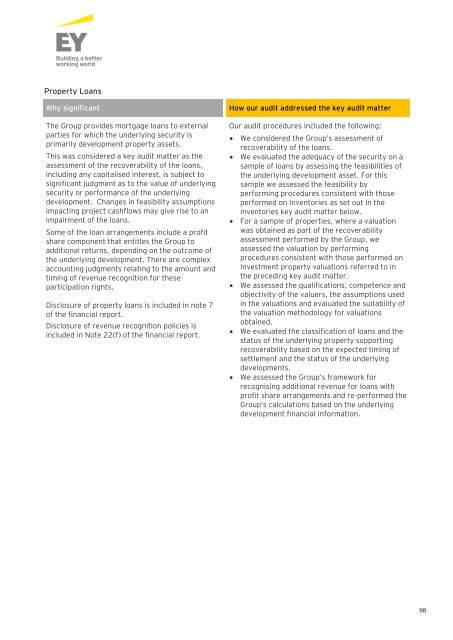Abacus Property Group – Annual Financial Report 2018
You also want an ePaper? Increase the reach of your titles
YUMPU automatically turns print PDFs into web optimized ePapers that Google loves.
ABACUS PROPERTY GROUP<br />
NOTES TO THE FINANCIAL STATEMENTS<br />
30 JUNE <strong>2018</strong><br />
22. SUMMARY OF SIGNIFICANT ACCOUNTING POLICIES<br />
(z) Earnings per stapled security (EPSS)<br />
Basic EPSS is calculated as net profit attributable to stapled security holders, adjusted to exclude costs of<br />
servicing equity (other than distributions) divided by the weighted average number of stapled securities on issue<br />
during the period under review.<br />
Diluted EPSS is calculated as net profit attributable to stapled security holders, adjusted for:<br />
- costs of servicing equity (other than distributions);<br />
- the after tax effect of dividends and interest associated with dilutive potential stapled securities that have<br />
been recognised as expenses; and<br />
- other non-discretionary changes in revenues or expenses during the period that would result from the dilution<br />
of potential stapled securities;<br />
divided by the weighted average number of stapled securities and dilutive potential stapled securities, adjusted for<br />
any bonus element.<br />
(za) Security based payment plans<br />
Executives of the <strong>Group</strong> receive remuneration in the form of security based payments, whereby Executives<br />
render services as consideration for equity instruments (equity-settled transactions).<br />
The cost of equity-settled transactions is determined by the fair value at the date when the grant is made, using<br />
an appropriate valuation model and is recognised, together with a corresponding increase in other capital<br />
reserves in equity, over the period in which the performance and/or service conditions are fulfilled. The<br />
cumulative expense recognised for equity-settled transactions at each reporting date until the vesting date reflects<br />
the extent to which the vesting period has expired and the <strong>Group</strong>’s best estimate of the number of equity<br />
instruments that will ultimately vest. The income statement expense or credit for a period represents the<br />
movement in cumulative expense recognised as at the beginning and end of that period and is recognised in<br />
employee benefits expense (Note 20).<br />
No expense is recognised for awards that do not ultimately vest, except for equity-settled transactions for which<br />
vesting is conditional upon a market or non-vesting condition. These are treated as vesting irrespective of<br />
whether or not the market or non-vesting conditions are satisfied, provided that all other performance and / or<br />
service conditions are satisfied.<br />
When the terms of an equity-settled award are modified, the minimum expense recognised is the expense had<br />
the terms not been modified, if the original terms of the award are met. An additional expense is recognised for<br />
any modification that increases the total fair value of the security based payment transaction, or is otherwise<br />
beneficial to the employee as measured at the date of modification.<br />
When an equity-settled award is cancelled, it is treated as if it vested on the date of cancellation, and any<br />
expense not yet recognised for the award is recognised immediately. This includes any award where non-vesting<br />
conditions within the control of either the entity or the employee are not met.<br />
93











